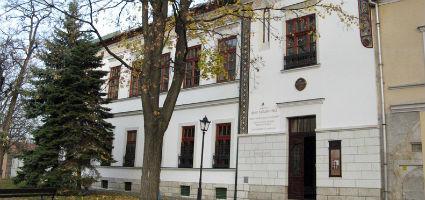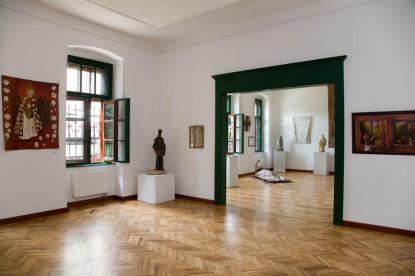2026. January 1. Thursday
The Roman-Catholic Ecclesiastical Collection in Sárospatak - Sárospatak
 |
Address: 3950, Sárospatak Szent Erzsébet utca 13.
Phone number: (47) 314-107
E-mail: spatak@enternet.hu
Opening hours: Tue-Sat 10-18
|
Museum tickets, service costs:
|
Ticket for adults
|
500 HUF
|
|
|
Ticket for students
|
300 HUF
|
|
|
Ticket for pensioners
|
300 HUF
|
Elisabeth of Hungary is the most widely known Hungarian female saint. We celebrated the 800th anniversary of her birth in 2007. On the occasion, the town of her birth, Sárospatak, the Hungarian Catholic Church and several civil organizations saluted the saint with a large scale programme series.

The Elisabeth of Hungary House located in the Queen Yard opened its gate for the visitors on 19 May 2007 with its applied- and fine art exhibition entitled Honorem Sanctae Elisabeth - Honouring Elisabeth of Hungary.
The works of art by twenty artists mirror authentically the respect with which Elisabeth of Hungary is honoured. The cream of Hungarian art scene, all those who feel responsible for the outcasts of society, as well as honour of Elisabeth of Hungary, participated at the event. Paintings, drawings, woven and handy work textiles, collages, fire enamels, small statues made of varied material herald the goodness and sacrificial life of Elisabeth of Hungary. Obviously, most of the exhibiting artist are women (Ildikó Csete, Enikő Orient, Ritta Háger, Erzsébet Szekeres, Zsuzsa Pannonhalmi). However, it is moving how finely men elaborated on this 'feminine topic' - eg. Gyula Somos, Attila Boros and Tamás Olescher with their paintings and Gábor Rácz with his fire enamels. The statue by István Madarassy also shine with the beauty, goodness and self-sacrifice of Elisabeth of Hungary.

The Elisabeth of Hungary House located in the Queen Yard opened its gate for the visitors on 19 May 2007 with its applied- and fine art exhibition entitled Honorem Sanctae Elisabeth - Honouring Elisabeth of Hungary.
The works of art by twenty artists mirror authentically the respect with which Elisabeth of Hungary is honoured. The cream of Hungarian art scene, all those who feel responsible for the outcasts of society, as well as honour of Elisabeth of Hungary, participated at the event. Paintings, drawings, woven and handy work textiles, collages, fire enamels, small statues made of varied material herald the goodness and sacrificial life of Elisabeth of Hungary. Obviously, most of the exhibiting artist are women (Ildikó Csete, Enikő Orient, Ritta Háger, Erzsébet Szekeres, Zsuzsa Pannonhalmi). However, it is moving how finely men elaborated on this 'feminine topic' - eg. Gyula Somos, Attila Boros and Tamás Olescher with their paintings and Gábor Rácz with his fire enamels. The statue by István Madarassy also shine with the beauty, goodness and self-sacrifice of Elisabeth of Hungary.
